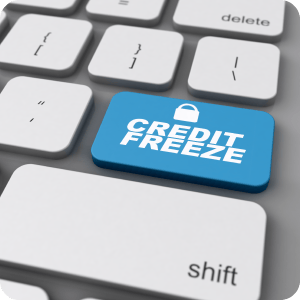There are many reasons someone might want to freeze their credit or lock their credit report down. These might include being the victim of a stolen identity or being worried about a data breach. Both of these situations are stressful and can be overwhelming. If you’re worried that your data has been breached or that there is fraud on your account, consider freezing your credit. We’ll walk you through how a credit freeze works and the steps and considerations you should take.
How to Freeze Your Credit
All three credit bureaus – Equifax, TransUnion, and Experian – offer the free credit freezes. Yet, placing a credit freeze at one bureau will not carry over to the other two. So if you decide to freeze your credit, be sure to place the order at all three bureaus.
What is Protected
Freezing your credit locks down your files, thereby preventing credit checks. That means unauthorized individuals cannot obtain credit cards, loans, or anything else in your name that requires a credit check. Here’s more information from the Federal Trade Commission.
What About Credit Reports
It’s still very important to monitor your credit report for discrepancies. Credit freezes do not affect this practice. You are entitled to one free report from the major credit bureaus per year, and can order it at www.annualcreditreport.com.
What are the Pros of Freezing My Credit
If you’re dealing with identity theft, freezing your credit can offer peace of mind. No one will be able to open credit accounts in your name, which can save you the hassle and cost that come with having your identity stolen. It is the strongest form of protection for the sensitive data in your credit reports, and it is free.
What are the Cons of Freezing My Credit
Freezing your credit can be inconvenient. You need to contact all three bureaus. You also have to establish accounts with Equifax and TransUnion when you freeze or thaw online, while PINs are required when you unfreeze by phone or postal mail. Meanwhile, Experian requires you to keep track of your PIN to freeze and unfreeze your files regardless of method.
A freeze can give you a false sense of security — you may still be susceptible to credit fraud or other fraud involving your Social Security number. A credit freeze won’t affect your current accounts, but if a thief steals the information on an existing account, your credit may be used without your permission. It is still important to check statements carefully.




